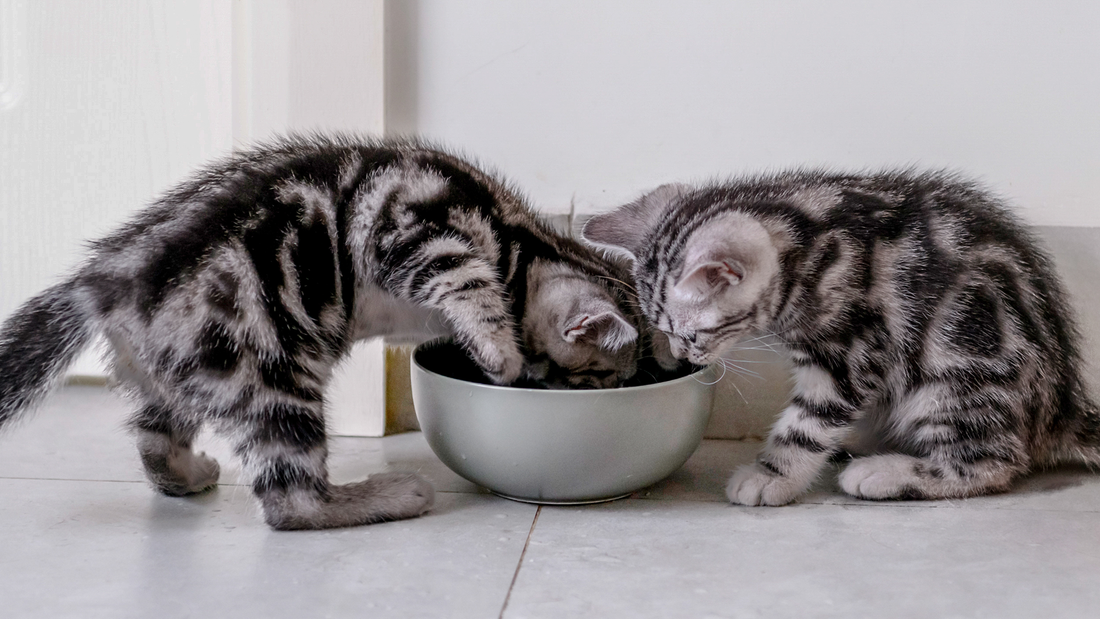
Kitten Nutrition 101: Feeding for a Healthy Start
Share
Kitten Nutrition 101: Feeding for a Healthy Start
Bringing a kitten home is an exciting time, their playful pounces and meows are certainly very irresistible, but behind all that cuteness is a growing body that needs the right nutrition to thrive. Just like human babies, kittens go through rapid growth and development, and their diet plays a crucial role in shaping their future health.
Let’s discuss everything you need to know about feeding your kitten and ensuring they have the best start!
Why does nutrition matter?
Kittens grow rather quickly so feeding them the right diet during this stage sets the foundation for a healthy immune system, strong muscles and bones, and optimal development. In order for us to help support their growth they require:
- More protein and calories than adult cats
- Essential fatty acids for brain and eye development
- Vitamins and minerals like calcium and phosphorus for strong bones
- Taurine, an amino acid critical for heart and eye health
What should I feed my kitten?
During the first 12 months of their life kittens require a kitten formulated diet, the reason behind this is that these diets contain the correct and essential vitamins and minerals that help play a vital role in your kittens development.
When choosing a diet or specific brand, always check the packaging to ensure it is appropriate for kittens and also states it’s ‘complete and balanced’.
Brands such as Royal Canin, Hills and Advance have special diets formulated specifically for kittens and you can find these in our online store at www.cvsonline.com.au.
When can my kitten start eating solid food?
Kittens usually start weaning off their mother’s milk around 4 weeks of age, and by 8 weeks, they should be fully transitioned to solid food. If you're hand-raising kittens, a kitten milk replacer is needed until they’re ready to begin weaning.
Royal Canin’s Baby Cat Milk Replacer is a great product to use if you are hand raising.
How often should I feed my kitten?
Even though kittens are small they have big energy needs, because of this ideally, they should eat multiple small meals a day:
- Under 6 months old: 3–4 meals per day
- 6–12 months old: 2–3 meals per day
- 12 months and over: transition to adult food and two meals per day
Ensure there is always access to fresh, clean water, especially if feeding dry food.
What foods should I avoid feeding?
Not all human food or pet treats are safe for kittens, it’s recommended go avoid:
- Cow’s milk – can cause digestive upset
- Dog food – lacks essential nutrients for cats
- Bones, onions, garlic, chocolate, caffeine – toxic to cats
- Raw meat/fish or eggs – risk of bacteria and nutritional imbalances
Can I use supplements?
If you're feeding a complete and balanced kitten food, additional supplements aren’t usually required. In fact, too much of certain vitamins and minerals can be harmful. We recommend speaking with your veterinarian or certified veterinary nutritionist before introducing any supplements.
When do I transition to adult food?
Once your kitten reaches 12 months of age you can begin to transition them from a kitten diet over to an adult diet. When transitioning any diet, it is important to do it gradually to avoid stomach upset by gradually adding more of the new diet and removing parts of the old diet over the course of a week.

Need help choosing the right food?
We know it can be dauting trying to find the right foods to suit our kittens needs and with the large range of diets and brands out there it can seem overwhelming which is why we recommend reaching out to your veterinarian or certified veterinary nutritionists who can help provide personalized advice based on your kitten’s breed, size, and lifestyle.
You can reach out to our veterinary team at Cameron Veterinary Services on (08) 8318 180
 is here! Shop now, pay later in 4 easy installments
is here! Shop now, pay later in 4 easy installments